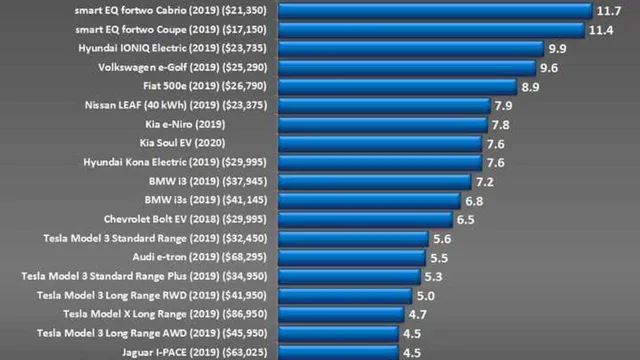Do you want to know about the acceleration of electric cars? If so, you’re in the right place. Electric cars are becoming increasingly popular due to their eco-friendly nature. But what makes them stand out is their acceleration.
Electric cars are known for having impressive acceleration capabilities, and this article will explain why. You’ll learn about the technology that enables electric cars to accelerate quickly and the various factors that can affect their acceleration. With this knowledge, you’ll be able to get the most out of your electric car and enjoy its amazing acceleration. So, let’s dive in and explore the wonderful world of electric car acceleration!
What Is Acceleration in an Electric Car?
Driving around in a car powered by electricity has its own appeal. Whether you’re looking to reduce your carbon footprint or you just want to experience the performance of an electric vehicle, you may be wondering – what is the acceleration of an electric car? The acceleration of an electric car is determined by a variety of factors. These can include the size of the battery, the type of motor, the weight of the vehicle, and the motor’s power output.
Generally, electric cars tend to have quicker acceleration than vehicles powered by internal combustion engines. This is due to the fact that electric motors can generate a great amount of torque, or rotational force, immediately. This leads to a more instant response when accelerating.
The acceleration of an electric car is also affected by the amount of energy stored in the battery. Generally, the larger the battery, the more energy it can store and the longer the car can travel on a single charge. However, a larger battery also adds weight to the vehicle, making it heavier and reducing its acceleration.
In addition to the size of the battery, the type of motor and its power output will also affect an electric car’s acceleration. Motors come in a variety of sizes and can have different power outputs, so it’s important to choose the right motor for your needs. Motors with higher power outputs will provide better acceleration, but they may also require more energy from the battery, reducing the range of the vehicle.
Finally, the overall weight of the vehicle will also affect the acceleration of an electric car. Heavier vehicles will require more energy to accelerate, leading to slower acceleration. On the other hand, lighter vehicles will be able to accelerate faster.
In short, the acceleration of an electric car depends on a variety of factors, including the size of the battery, the type of motor, its power output, and the weight of the vehicle. Electric cars tend to have quicker acceleration than vehicles powered by internal combustion engines, but the acceleration can be affected by the size of the battery, the type of motor, and the overall weight of the vehicle.
Factors Affecting Electric Car Acceleration

Electric cars have quickly become a popular option for those looking to reduce their carbon footprint and save money on fuel costs. But one of the biggest questions that people have about electric cars is, “What is the acceleration of an electric car?” The answer depends on several factors, including the type of vehicle, the battery capacity, and the powertrain. Different types of electric cars can have different accelerations, ranging from low to very high.
Battery capacity is one of the most important factors affecting electric car acceleration, as a larger battery will provide more power and, therefore, a faster acceleration. The size and type of the vehicle’s motor, as well as the type of powertrain, can also have an impact on the acceleration of an electric car. Finally, the weight of the vehicle and the amount of drag it experiences on the road can also be factors that affect acceleration. Ultimately, the acceleration of an electric car can vary greatly depending on these factors.

Measuring Electric Car Acceleration
Electric cars are becoming increasingly popular due to their environmental and cost advantages, leaving many wondering, “What is the acceleration of an electric car?” While there is no one-size-fits-all answer to this question, it’s important to consider several factors, such as the model of the vehicle, its battery size, and the type of terrain on which it’s being driven. Generally, electric cars tend to have better acceleration than traditional combustion engine cars, with some models boasting 0-60 times as low as 5 seconds.
However, acceleration can also be affected by the terrain on which the car is being driven, as well as the driver’s skill level. Ultimately, electric cars offer great acceleration, and the best way to gauge the acceleration of any particular electric car is to test drive it.
What Is the Average Acceleration of an Electric Car?
Electric cars have become increasingly popular in recent years due to their environmental friendliness, convenience, and cost savings. But what about their acceleration? How do electric cars measure up to traditional gas-powered cars when it comes to speed? The average acceleration of an electric car depends on several factors, including the type of motor, battery capacity, and weight. Generally speaking, electric cars tend to have a higher acceleration than gas-powered cars.
This is because electric cars have instant torque, meaning that they can deliver power quickly and efficiently. This makes them ideal for rapid acceleration on the road. However, the acceleration of an electric car can vary greatly depending on its power source.
For example, performance electric cars, like the Tesla Model S, are capable of reaching 0-60 mph in as little as 3 seconds. This makes them much faster than traditional gas-powered cars, which typically take around 5 to 7 seconds to reach the same speed.
On the other hand, electric cars with lower power outputs may take significantly longer to accelerate. For example, the Nissan Leaf has an acceleration rate of around 8 seconds to reach 60 mph. This is still faster than most gas-powered cars, but it is not as impressive as the performance of a more powerful electric car.
Overall, the average acceleration of an electric car depends on the type of motor, battery capacity, and weight. Electric cars typically have higher acceleration than traditional gas-powered cars due to their instant torque, but this can vary greatly depending on the power output of the vehicle.
Electric Car Acceleration VS Gas Car Acceleration
Electric cars are becoming increasingly popular, and one of the most sought-after features of these vehicles is their acceleration. Although electric cars have been around for some time now, advances in technology have drastically increased their performance and, in turn, their acceleration. When compared to gas cars, electric cars offer significantly better acceleration, with some models achieving 0-60 mph times in as little as 3 seconds.
This is because electric cars have instant torque, meaning they can reach maximum power without having to wait for the engine to rev. Additionally, electric cars have fewer moving parts, allowing them to reach their top speeds more quickly. Gas cars, on the other hand, must wait for the engine to rev, and their performance is limited by the number of moving parts. Ultimately, electric cars offer much faster acceleration than gas cars, providing a smoother, more responsive driving experience.
Improving Electric Car Acceleration
Electric cars have become increasingly popular in recent years due to their environmental benefits and cost-efficiency. However, one of the most common criticisms of electric vehicles is their slow acceleration compared to traditional gasoline-powered cars. While electric cars have improved in this area over the years, many people are curious to know what the acceleration of an electric car really is.
When it comes to acceleration, electric cars have come a long way. A typical electric vehicle can reach 60 mph in around 8 seconds, while some high-performance models can reach 60 mph in as little as 3 seconds. This is significantly faster than the average gasoline-powered car, which typically takes around 10 seconds to reach 60 mph.
Electric cars also have the advantage of providing instant torque, which allows them to quickly reach their top speeds. Overall, electric cars have come a long way in terms of acceleration. With the right model, you can experience a smooth and powerful ride that is unlike any other.
Conclusion
The acceleration of an electric car is impressive and distinct. Electric cars have the advantage of instant torque, allowing for quick and powerful acceleration. Factors such as battery size, motor type, power output, and vehicle weight can influence an electric car’s acceleration. While electric cars generally have better acceleration than gas-powered cars, the specific acceleration can vary depending on the model.
However, overall, electric cars offer a smoother, more responsive driving experience with their superior acceleration. As technology continues to advance, we can expect electric cars to further improve their acceleration capabilities. So, buckle up and enjoy the thrilling ride that electric car acceleration has to offer
Frequently Asked Questions [FAQs]
What Is The Acceleration Of An Electric Car?
The acceleration of an electric car depends on the type of motor, battery capacity, and other factors, but typically, electric cars have a 0-60 mph time of around 6-7 seconds.
What Is The Range Of An Electric Car?
The range of an electric car depends on the battery capacity, motor type, and other factors, but typically, electric cars can travel around 100-200 miles on one charge.
Are Electric Cars Eco-friendly?
Yes, electric cars are eco-friendly because they produce no emissions and require no gasoline for operation.
How Fast Can Electric Cars Go?
Electric cars can typically reach speeds of up to 100 mph, depending on the type of motor and battery capacity.
How Much Does An Electric Car Cost?
The cost of an electric car can vary depending on the make and model, but typically, they range from around $30,000 to $90,000.
Do Electric Cars Require Regular Maintenance?
Yes, electric cars require regular maintenance, such as oil changes, brake checks, and tire rotations.

I am James Beaupre, the founder of batteryvehicleprice.com. With a deep-rooted passion for vehicle batteries, I have dedicated my career to exploring and understanding the intricacies of this crucial technology. My website aims to provide valuable insights and information on battery-powered vehicles, empowering individuals to make informed decisions.
